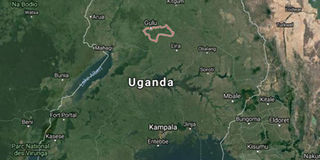Prime
Omoro leaders lose sleep over rising suicide cases

A map of Uganda showing the location of Omoro District.
What you need to know:
- Report. Police annual crime report released last week, indicates that 44 people died within Acholi Sub-region as a result of domestic violence last year.
OMORO. District leaders and security personnel in Omoro have expressed concern over the rate at which locals are committing suicide.
The leaders argue that the vice is bound to escalate if there are no deliberate efforts to control it.
Carved out of Gulu in 2016, Omoro District has lately been in the news for numerous suicide cases with the most recent being a 28-year-old man who was found hanging on a tree branch on June 13.
Ronald Abola reportedly killed his wife Lucy Acan in Pece Division, Gulu Municipality after a domestic brawl on June 3.
He then decided to end his life after hiding for more than a week at his ancestral home in Ayom Village in Jaka Parish, Lalogi Sub-county.
His death as a result of suicide is one of the many cases that are currently being reported in the district almost on a monthly basis.
Statistics from the police indicate that nine people, of which eight are men and one woman, have so far taken their own lives in the district since January. The cases have been mostly reported in Koro and Odek Sub-counties.
The police are attributing the high suicide cases to domestic violence, high poverty rates among youth and alcoholism.
Ms Flavia Acayo, the Omoro District criminal investigations officer, told Daily Monitor in an interview last week that cases of people committing suicide have become alarming.
Ms Acayo said many of the cases are being registered among individuals aged between 25 and 40 years with alcohol and domestic violence as major driving factors.
“Majority of those who killed themselves were involved in domestic violence with their partners. Many people don’t involve the local authorities or police in solving their grievances and they end up taking their lives,” Ms Acayo said.
She noted that although the cases continue to puzzle police and local leaders, they have been sensitising communities on better ways of solving domestic disputes.
Ms Acayo said in one of their engagements, the police saved the life of a man who had wanted to commit suicide.
The district chairperson, Mr Douglas Peter Okello, however, noted that the problem has been compounded by trauma resulting from the Joseph Kony-led Lord’s Resistance Army insurgency.
“The war affected many of our people psychologically, emotionally and physically. Some of the areas where the cases are being committed were former battle grounds where locals witnessed heinous acts,” Mr Okello said.
He also noted that mental illnesses have been behind some of the suicide cases citing that those affected do not have time to think between good and bad.
Mr Okello noted that the district, together with partners such as World Vision and Thrive Gulu, have intervened in carrying out psychological counselling to trauma victims.
“We acknowledge the increase in cases of suicide and know how dangerous it is for a society that needs counselling as a therapy for healing them,” Mr Okello said.
Acholi Cultural Institution Premier Ambrose Ola noted that some of the residents were never prepared to face life on their own after the two decade-long LRA war in the region.
“Some of the people, NGOs and even government never took time to learn the aftermath of the war. When peace returned, some of those affected found their world was closed, they started experiencing pressure in life, and they faced economic distress but had nowhere to run to. They resorted to alcohol and end result was suicide,” Mr Ola said.
Hurdle
He also noted that inappropriateness of approaching the challenges of suicide in the region has been the biggest challenge in seeking lasting solution.
“Sometimes these problems are diagnosed as scientific yet they demand traditional approaches in curing them,” Mr Ola said on Monday.
Nwoya District, just like Omoro, has had high numbers of people committing suicide since last year.
A total of 25 people last year committed suicide in Koch Goma Sub-county alone, prompting religious leaders to hold a prayer to cleanse the area in August same year.
Police annual crime report released last week, indicates that 44 people died within Acholi Sub-region as a result of domestic violence last year.


